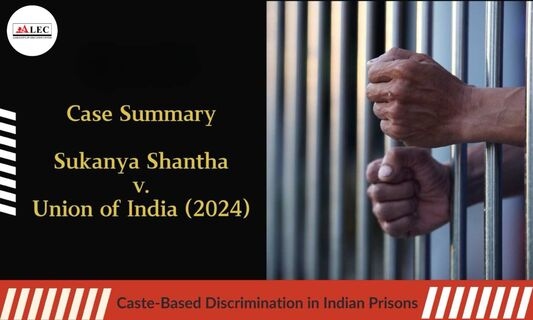Sukanya Shantha vs Union of India (2024) is a landmark Supreme Court case addressing caste-based discrimination in Indian prisons. The case, filed by journalist Sukanya Shantha, was triggered by her investigative article that exposed how prison manuals in various Indian states allowed for practices perpetuating caste hierarchies. She sought to challenge these discriminatory practices, which violated the fundamental rights of equality and dignity enshrined in the Constitution.
Background and Facts
Sukanya Shantha, in her article titled “From Segregation to Labour, Manu’s Caste Law Governs the Indian Prison System,” highlighted systemic discrimination in prison management. The article revealed that prisoners were often assigned manual labour and housed based on caste, with denotified tribes (formerly categorized as "criminal tribes") facing particular discrimination. This practice, rooted in outdated colonial-era laws, was still reflected in the prison manuals of several states. Identical discriminatory laws were found within the State Prison Manual of 13 major states including Rajasthan, Madhya Pradesh, Orissa, Uttar Pradesh, Tamil Nadu, Delhi, Punjab, Bihar, Maharashtra, etc. The petitioner challenged these practices as unconstitutional.
Denotified Tribes Menaing.-
(i) Communities in India that were once listed as "criminal tribes" under the Criminal
(ii) Tribes Acts, which were enforced by the British Raj between 1871 and 1947. The Independent Indian Government repealed these acts in 1952, "de-notifying" these communities which were then referred to as the denotified tribes.
Legal Issues and Grounds
The primary issues in this case revolved around the violation of fundamental rights under:
- Article 14 (right to equality),
- Article 15 (prohibition of discrimination),
- Article 17 (abolition of untouchability),
- Article 21 (right to life and dignity), and
- Article 23 (prohibition of forced labor).
On Grounds.-
(i) The division of manual labour,
(ii) Segregation of barracks,
(iii) Provisions that discriminate against prisoners belonging to Denotified tribes and “habitual offenders”.
The petitioner argued that these practices reinforced caste-based hierarchies within the prison system and demanded that the outdated provisions in state prison manuals be repealed.
Judgment
On October 3, 2024, the Supreme Court delivered a landmark ruling, declaring caste-based discrimination in Indian prisons unconstitutional. Chief Justice D.Y. Chandrachud emphasized that India's Constitution is a document of emancipation designed to eradicate caste hierarchies and promote dignity for all citizens. The court directed all states to review and revise their prison manuals to eliminate any discriminatory provisions. It also mandated that states establish monitoring mechanisms to ensure compliance with the constitutional mandate of equality.
Impugned Section and Reform
The impugned sections were those within the state prison manuals that sanctioned discriminatory practices based on caste. The court noted that while the Model Prison Manual of 2016 addressed some concerns, it was inadequate in fully eliminating caste-based biases. The judgment also criticized the colonial-era label of "habitual offenders" disproportionately applied to marginalized groups such as denotified tribes, calling for its reevaluation.
Impact
This ruling is expected to catalyze broader reforms in India's prison system, ensuring that prisons uphold the constitutional values of equality and dignity. It highlights the ongoing relevance of social justice in the legal system and the need for continued vigilance against entrenched caste discrimination.
You can also read the Blogs by clicking [Blogs section]
For more information, visit [ALEC Enquiry].

